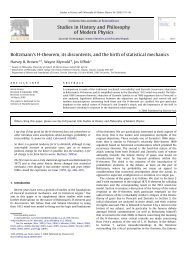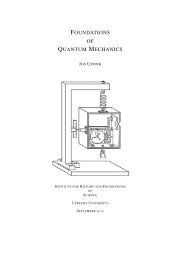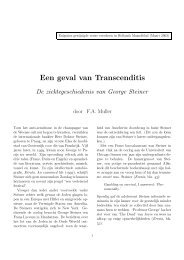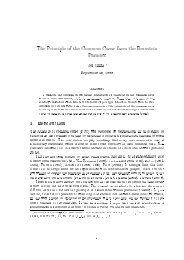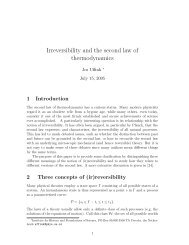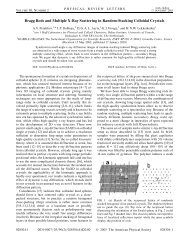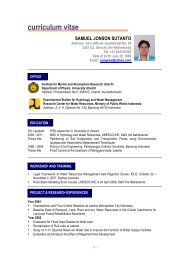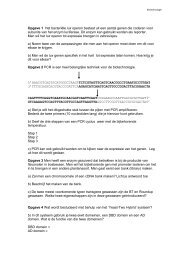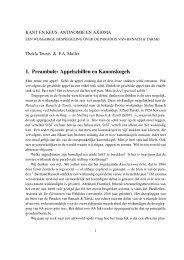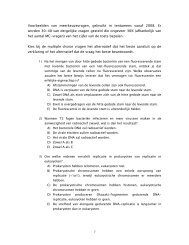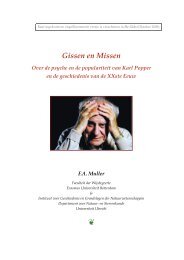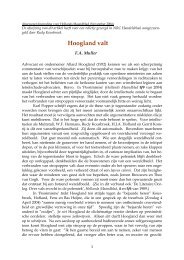Subjective probability and statistical physics
Subjective probability and statistical physics
Subjective probability and statistical physics
Create successful ePaper yourself
Turn your PDF publications into a flip-book with our unique Google optimized e-Paper software.
we do not know how to assign a <strong>probability</strong> value p to an event A, such that P (A) = p,<br />
can we then still make up our mind about how probable it should be that p takes on<br />
a particular value? Note that we are now asked, not to assess an objective issue, but<br />
rather to evaluate an epistemic judgement about our epistemic judgments.<br />
In the 20th century, de Finetti in particular rejected the very basis of Bayes’<br />
approach. According to him, the notion of an unknown <strong>probability</strong> is utterly meaningless,<br />
or a “mythological pseudo-entity”. The idea of assigning a <strong>probability</strong> to an<br />
unknown <strong>probability</strong> is even worse. For a radical subjectivist like de Finetti, this<br />
would involve the prospect of a rational agent, who is somehow unable to evaluate<br />
his or her degree of belief to assign to event A, but yet able to judge quantitatively<br />
how uncertain (s)he is about what these degrees of belief may be. He regarded this<br />
prospect as psychologically absurd.<br />
Today, the name of Bayes is often associated with the subjective view on <strong>probability</strong>.<br />
We have already seen that this subjective view was in fact much older, <strong>and</strong><br />
explicitly stated by Bernoulli. In contrast, Bayes was much more vague <strong>and</strong> uncommitted<br />
about what he understood by <strong>probability</strong>. According to the covering letter<br />
by Price, Bayes felt apologetic about his definition of <strong>probability</strong>, <strong>and</strong> aimed to avoid<br />
any dispute about the meaning of the word. Thus while subjectivists in <strong>probability</strong><br />
theory, including those who radically oppose the notion of objective chance, like de<br />
Finetti, often call themselves ‘Bayesians’, it is ironic to note about Bayes’ contribution<br />
is that, by introducing probabilities of probabilities, his paper is really the first<br />
to invite the notion of objective chance!<br />
3 Modern subjectivism: Ramsey <strong>and</strong> de Finetti<br />
Since the 1920s the subjective view on <strong>probability</strong> witnessed a revival which is continuing<br />
to the present. The main protagonists of this revival, F.P. Ramsey <strong>and</strong> B. de<br />
Finetti, <strong>and</strong> (somewhat later) L.J. Savage <strong>and</strong> R. Jeffrey, espouse a view of <strong>probability</strong><br />
makes no claim that all rational minds, in the possession of the same information<br />
should agree upon their evaluation of probabilities. Rather, this view, sometimes<br />
called personalist, holds that any system of beliefs that a person wishes to entertain,<br />
whether based on empirical information, expert opinion or sheer prejudice is equally<br />
allowed. Thus, there is no need for a principle like that of Insufficient Reason.<br />
The only requirement placed on rational beliefs is that the condition of coherence,<br />
i.e. that a rational mind should not judge as acceptable bets that one can never win<br />
but might loose. One of the main tenets of this approach is the famous Dutch Book<br />
Theorem, which states, essentially that this condition of coherence implies that such<br />
rational degrees of belief must obey the ordinary rules of the <strong>probability</strong> calculus<br />
(i.e. the Kolmogorov axioms, with the exception of σ-additivity). But the converse is<br />
also true: any <strong>probability</strong> measure obeying the ordinary rules is coherent, <strong>and</strong> hence<br />
represents a legitimate system of beliefs.<br />
Here, I will focus mainly on De Finetti. De Finetti was a subjectivist of a more<br />
radical approach than Bayes or Bernoulli had ever been. He utterly rejected the<br />
notion of unknown probabilities, <strong>and</strong> hence the very basis of Bayes’ approach to the<br />
above problem. De Finetti’s main result is his well-known exchangeability theorem<br />
(which was actually prefigured by Chuprov <strong>and</strong> W.E. Johnson). Let us begin with a<br />
9



